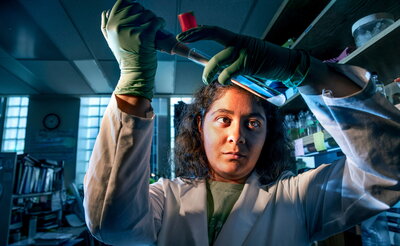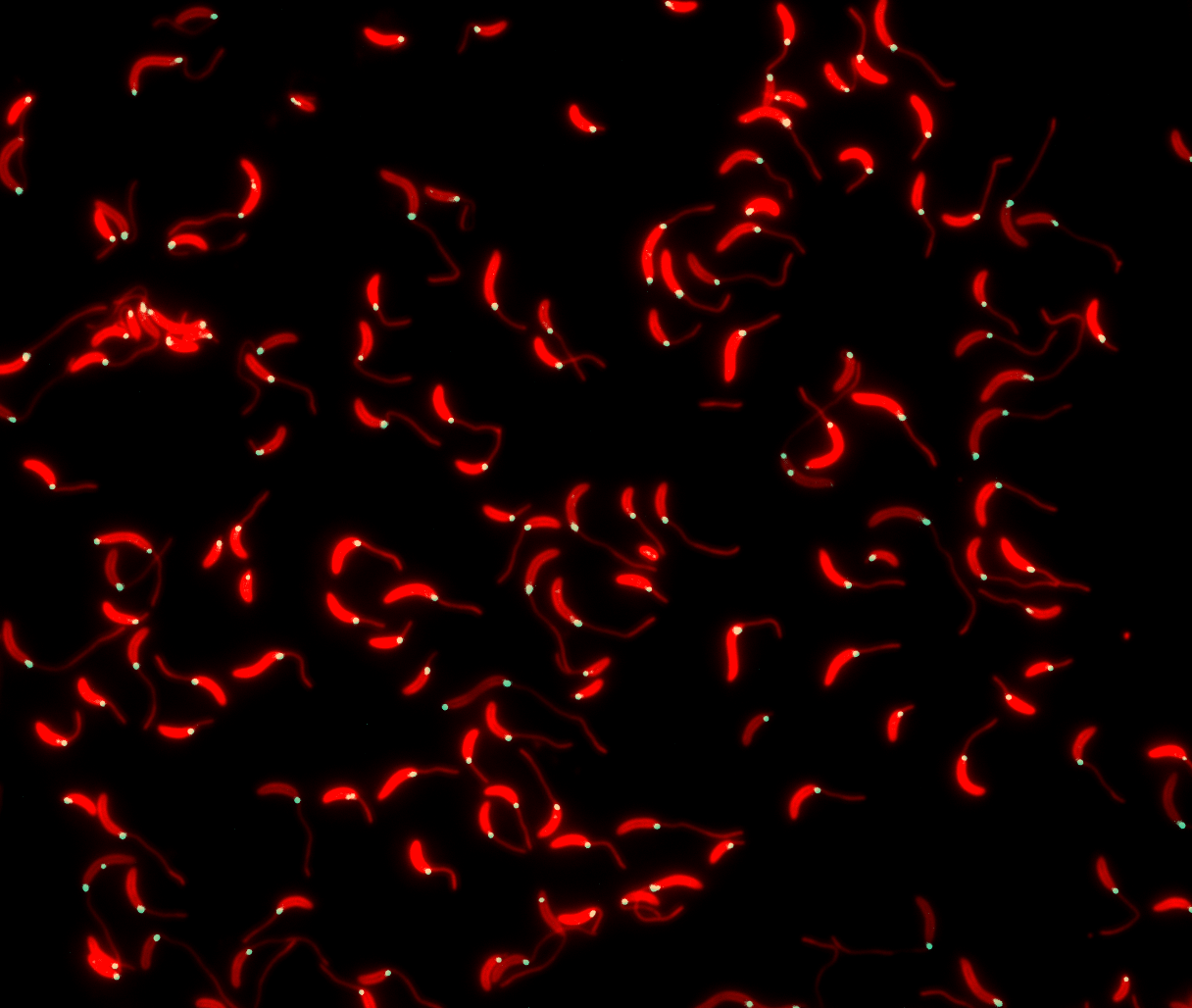
Request information Program overview Apply Current PhD students
Microbes are the dominant organisms on the planet and drive all aspects of life. The Department of Microbiology is a close-knit group of creative, bold, and passionate scientists who are addressing some of the toughest challenges facing our world through discoveries in bacterial and archaeal biology and physiology, bacterial and viral pathogenesis, antibiotic discovery, and microbial ecology and evolution. We are a collaborative, supportive, and active community with many opportunities for connecting with other scholars in the department, school, and across campus.

With a PhD in Microbiology, you can launch a career in academia, industry, or government. Our graduates can be found around the world, leading research programs at companies such as Abbvie and Eli Lilly and directing labs at top universities, research institutes, and government agencies.
Title
Hear more from our students
Stefanie Eben, a PhD candidate in the Department of Microbiology, shares how she fell in love with microbiology and how her graduate studies at Illinois have offered the perfect mixture of academic and personal fulfillment.
The PhD Program
Graduate degrees are earned through a combination of graded courses, oral and written examinations, and independent research. We empower students to design a program, in consultation with their advisors, that aligns with their academic background and scientific (or career) goals. Because the department is part of an umbrella PhD program in MCB, students admitted into any of these departmental graduate programs can select faculty thesis advisors from over 65 research laboratories in the school. Close ties are also maintained with the School of Integrative Biology, the School of Chemical Sciences, the Carle Illinois College of Medicine, the College of Veterinary Medicine, and the Microbial Systems Initiative.
Our department provides a comprehensive training program in microbiology and molecular biology. During your first semester, you will take two core courses designed to provide a strong background in cell physiology, biochemistry (MCB 501), and genetics (MCB 502). Subsequent course work is selected to complement your interests and area of research.
First-year students rotate through three research labs to become acquainted with several labs and to learn new experimental techniques. Each rotation is five weeks long. You can choose rotation laboratories from any department in the School of MCB. Near the end of the fall semester, you will choose a research advisor, and together propose a research project that forms the basis of a dissertation.
In the spring semester of the first year, you will write a short, NIH-style grant proposal on the proposed project and describe it to a faculty committee. The committee makes suggestions regarding project strategy and may recommend areas of basic knowledge that should be explored in greater depth to enhance your success on the project and in the preliminary exam.
At the end of the second year, you will take an oral preliminary exam to test your scientific knowledge and ability to solve research problems. After passing the preliminary exam, you will concentrate on research. It takes approximately five years to complete the PhD program.
Degree requirements Departmental handbook Courses
Financial Support
All students admitted to the PhD program receive financial support throughout their graduate training. Support includes a tuition waiver and a stipend. After the first semester, graduate students are supported by research assistantships, training grants, or teaching assistantships. Graduate students are required to pay the university health fee to cover insurance and health benefits.
Facilities
The Department of Microbiology is located in the state-of-the-art Chemical and Life Sciences Laboratories (CLSL). Central to main campus, the CLSL houses all of the major equipment and expertise necessary for research in microbiology, cell biology, molecular biology, and biochemistry. Both the School of MCB and campus house a wide array of research facilities and support services. Faculty collaborate on reseach with partners across campus.
Title
Community
The Microbial Early-career Researchers Association (microERA), a networking and professional development group for early-career scientists at Illinois, welcomes all undergraduate, graduate students, and postdocs conducting research broadly relevant to microbiome or microbial sciences to join.
The MCB Graduate Student Association, also known as the MCBees, organizes professional development and social activities as well as outreach events, such as Science on Tap and visits to local schools.
How to Apply
The Department of Microbiology is a part of the School of Molecular & Cellular Biology (MCB), which includes the Departments of Biochemistry, Cell & Developmental Biology, and Molecular & Integrative Physiology.
Students interested in pursuing the PhD in Microbiology should apply directly to the MCB PhD Program and select "Microbiology" for the field of specialization in the application.
To be considered for admission, you must:
- have a bachelor's degree from an accredited college or university with course work in biological sciences, chemistry, and physics;
- submit three letters of recommendation, including at least two from science professors (if research has been performed, letters of recommendation should include one from the research supervisor);
Contact us
School of MCB PhD Programs
Shawna M. Smith, MCB Graduate Program Coordinator
Lori Raetzman, Associate Director of MCB Graduate Program
mcb-grad@illinois.edu; 217-333-1737
Department of Microbiology
Andrei Kuzminov, Professor of Microbiology; Director of Graduate Studies
kuzminov@illinois.edu
James M. Slauch, Professor and Department Head
slauch@illinois.edu; 217-244-1956
Diane L. Tsevelekos, Office Support Specialist
dtsevele@illinois.edu; 217-333-1736
